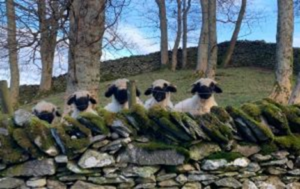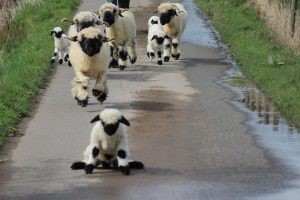Swiss Valais Black-Nose Sheep
Cathy M. Koos

Photo courtesy Jackie Simonini, Valais Blacknose Sheep, Lakeland UK
Is there a cute-as-a-button sheep in your future? Think no further than the Valais Blacknose sheep. Originating in the mountainous Valais region of Switzerland, the Schwarznasenschaf produce not only wool but meat. While the breed has been known since the 15th century, the Valais only became a recognized breed in 1962. Primarily found in Switzerland and parts of Germany, worldwide population of this endangered breed number 13-14,000.
Black noses and knees, creamy wavy fleece, these friendly, biddable creatures peer out through a tangle of bangs making this one of the cutest sheep in the world. Both rams and ewes sport spiral horns. Robust frames on both sexes, adults weigh in at 150 to 190 pounds, and 31-33 inches at the shoulder.
Measuring 30 microns and a 4-6-inch staple, this coarse carpet-type wool is also excellent for felting. Shearing occurs twice a year and the current market rate in the UK is about $50 for a whole raw fleece.
Ewes generally average 1.6 lambs per season – not an especially high reproductive rate. In an effort to boost population, breeders in UK and New Zealand have begun breeding programs. The US began importing semen in 2016, and, not without problems, the first generation of the breed came to the US in 2018.
While live sheep may not be imported into the US due to scrapie concerns, semen can be imported from Switzerland through a vendor on the east coast.
Photo courtesy Emily Duncan, Whitehall Valais Blacknose Sheep, UK
Penny Smith, an Amador County breeder, has been working with UC Davis veterinary school to develop her breeding program. Penny is the premier Olde English Southdown Baby doll breeder in the west. Using Penny’s Babydoll ewes and Scottish Blackface ewes, UC Davis artificially inseminated her ewes in 2018. Unfortunately, a rascally Babydoll ram thought to be too young jumped the fence, covered all the ewes and the first Valais cross breeding failed.
In 2019, Penny and UC Davis made another attempt, but this insemination did not take. In order to have registerable progeny, the breeding program must successfully continue to for 5 years. Try, try again.
There are other breeders the West who have had some success, so it is just a matter of time and patience till these cuties move into a farm near you.
REFERENCES
Penny Smith, Penwinkle Farm, Plymouth CA 209-418-4965
Emily Duncan, Whitehall Valais Blacknose Sheep, UK
https://www.rbst.org.uk/